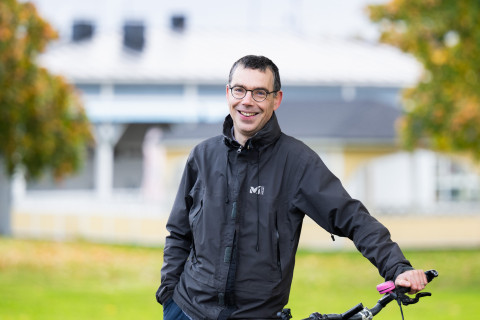Having a background in university history, Head of Department Pieter Dhondt plays a role in shaping the future of the university.
Many academics look back fondly on their old teachers, thanking them for sparking interest in their respective fields. Pieter Dhondt, too, recognises the role played by an excellent history teacher who inspired young Pieter to study history in his high school years in Belgium.
As a university student, Dhondt pondered between history and political science, ultimately selecting history at KU Leuven, where he also defended his doctoral dissertation. He also studied as an Erasmus student in Berlin, as well as at the University of Edinburgh.
Dhondt came to realise, first hand, how surprising dimensions historical events can have. When Dhondt studied Charles V’s landmark battle against the Turks in Tunis in 1535, and the celebrated ruler’s journey back home to Brussels through the big cities of Italy and France, he realised that many poems and songs shed interesting new light on the legend and propaganda of the time.
“After finishing my PhD, I was thinking about doing my postdoc abroad. My wife had worked as an exchange teacher in Oulu for a year and wanted to return to Finland. I, too, had good connections there. I had been in contact with Matti Klinge and Laura Kolbe, and that’s how I ended up at the University of Helsinki for three years,” Dhondt says.
He returned to Brussels for a research project, but the family’s love for the country up North pulled them back in 2011, this time to the University of Eastern Finland.
“I heard about a vacancy in Joensuu and was hired as a university lecturer, initially for a three-year period,” Dhondt says.
Ending up in eastern Finland was somewhat of a coincidence, but once there, the Dhondt family and their four children decidedly wanted to live close to nature. Dhondt commutes between home and campus by bicycle, and it’s been decades since his last flight – for climate reasons.
To me, a very important factor is the compact size of the academic community. It is extremely positive that even as an early-career researcher you can influence your work, and that the staff is listened to.
Pieter Dhondt
Head of Department of Geographical and Historical Studies
Current changes guide the direction of the future
Pieter Dhondt was appointed as Head of Department of Geographical and Historical Studies in spring 2020. As a scholar of university history, Dhondt also wants to commit himself to the future of universities. The direction in which the department evolves is, of course, drawn up in collaboration with staff and students.
“Half of my working hours go to administrative work, one quarter to teaching and one quarter to research. Administration can be a bit boring at times, but there are many different aspects to this role, and this variety is great. Changes are taking place at the department in consequence of retirements, and it is interesting to be involved in these changes and to seek a new direction,” Dhondt says.
As assets of the University of Eastern Finland, Dhondt mentions a close-knit scientific community and direct interaction.
“To me, a very important factor is the compact size of the academic community. It is extremely positive that even as an early-career researcher you can influence your work, and that the staff is listened to. I find it easy to communicate with faculty and university leadership,” says Dhondt.
From the perspective of an international staff member, English can surprisingly easily be used as a working language in Finnish universities. Nowadays, Dhondt has sufficient command of Finnish, and the university recommends Finnish language courses to its international staff and students – while also meeting the needs of the community exceptionally well in English.
If Dhondt had a magic wand, he knows exactly what to change in the university’s current funding system:
“It takes a lot of time to prepare funding applications. If I had the power to change things, a lion’s share of funding would be given directly to universities, and not be put up for application through different instruments,” Dhondt concludes.


